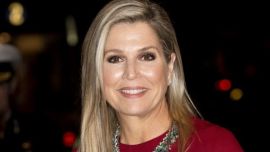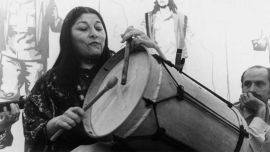Germany's All Quiet on the Western Front won the Oscar for Best International Feature Film at a glitzy award ceremony in Los Angeles on Sunday night, beating out local favourite Argentina, 1985 as well as Poland's Eo, Belgium's Close and Ireland's The Quiet Girl.
With nine nominations from the US Academy of Motion Picture Awards –– including one for the coveted Best Picture –– the German war epic was primed for success at the Dolby Theatre.
Nearly a century after the book by Erich Maria Remarque was published, the Netflix production capped a triumphant march through awards season with the Oscar win.
Nevertheless, Argentina, 1985 didn’t walk away from the awards season empty handed. The film was awarded the Golden Globe for Best Non-English Language Film in January and the Goya award for best Ibero-American film in February.
Nationally, the film garnered huge audiences and was the highest-grossing film of the year in cinemas. Paris Saint-Germain star and national team skipper Lionel Messi even showed his support, taking to social media in February to join his compatriots' campaign for the film to win the Oscar.
"What a great film, '1985,' with [actor] Ricardo Darín and nominated for an Oscar. Let's go for the third," Messi wrote on Instagram.
Director Santiago Mire’s drama, which details the efforts of prosecutors to put the leaders of the brutal 1976-1983 military dictatorship on trial for their crimes against humanity, was just one of five selected in the category from a pool of 70 films from all over the world.
The last time an Argentine feature film was nominated in the Best International Film category was Damián Szifrón's Relatos Salvajes (“Wild Tales”) which lost in 2014 to the Polish film Ida.
Argentina has won two Academy Awards in 1985 for La historia oficial ("The Official Story") and in 2009 for El secreto de sus ojos ("The Secret in Their Eyes").
Unorthodox winner
Elsewhere, surreal sci-fi film Everything Everywhere All at Once dominated the rest of the ceremony, winning seven golden statuettes including best picture, Hollywood's most coveted prize.
The unorthodox but beloved movie – which features multiple universes, sex toys and hot dog fingers – also won best director, best actress, best original screenplay, best editing, and both the best supporting actor and actress prizes.
Michelle Yeoh, who is Malaysian, becomes the first ever Asian woman to win best actress, for her portrayal of an exhausted Chinese laundromat owner embroiled in battle with an inter-dimensional supervillain – who happens to be her daughter.
"Thank you to the Academy, this is history in the making!" she said.
"Ladies, don't let anybody tell you you are ever past your prime," added the 60-year-old, whose career began decades ago with martial arts films in Hong Kong.
Comfortably the night's biggest winner, the film a word-of-mouth smash hit that has grossed US$100 million at the global box office.
In a plot that is not easily described, Yeoh's heroine Evelyn must harness the power of her alter egos living in parallel universes, which feature hot dogs as human fingers, talking rocks and giant dildos used as weapons.
The film, which features a predominantly Asian cast, was directed by Daniel Kwan and Daniel Scheinert – two young filmmakers who were previously best known for an oddball comedy about a talking corpse.
Kwan thanked his "immigrant parents," while his counterpart thanked his mother for never "squashing my creativity," including when he had dressed in drag as a child.
"Which is a threat to nobody," he added, to enormous cheers.
Vietnam-born Ke Huy Quan, 51, who was a major child star in the 1980s with Indiana Jones and the Temple of Doom and The Goonies, completed a stunning comeback from decades in the Hollywood wilderness by winning best supporting actor.
"My journey started on a boat. I spent a year in a refugee camp. And somehow, I ended up here on Hollywood's biggest stage... this is the American Dream," said Quan.
After the show, he came bounding into the backstage press room, shouting "Wow, wow, wow... Can you believe I'm holding one of these?"
He shared that Indiana Jones director Steven Spielberg had grabbed him and said: "You are now an Oscar winner!"
Other awards
Brendan Fraser won best actor for playing a morbidly obese teacher in The Whale, capping a remarkable career comeback.
Fraser was a major action star in the late 1990s with films like The Mummy, before largely disappearing from the public view.
"I started in this business 30 years ago, and things – they didn't come easily to me," he said, thanking director Darren Aronofsky for "throwing me a creative lifeline and hauling me aboard the good ship The Whale.'"
Best supporting actress Jamie Lee Curtis paid tribute to her parents Tony Curtis and Janet Leigh, both Oscar-nominated actors who never won.
In the night's other prizes, Guillermo del Toro's Pinocchio won best animated film, and Avatar: The Way of Water won best visual effects.
Navalny – about the imprisoned Russian dissident Alexei Navalny – won for best documentary.
–– TIMES



















Comments